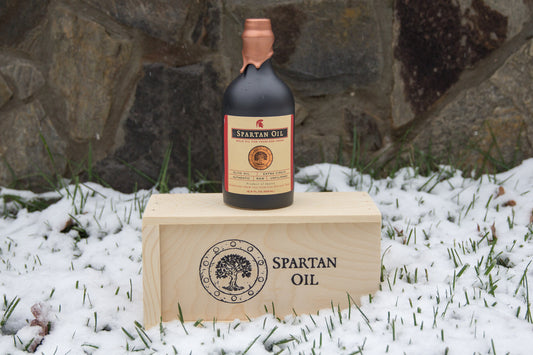News | Thoughts | Promotions
Virginia's Finest Designation for Spartan Oil
The Virginia Department of Agriculture and Consumer Services awards a special designation to products produced and processed in Virginia that meet certain criteria. We are very excited to announce that...
Virginia's Finest Designation for Spartan Oil
The Virginia Department of Agriculture and Consumer Services awards a special designation to products produced and processed in Virginia that meet certain criteria. We are very excited to announce that...

New Gift Options, including Gift Baskets
Are those jingle bells we hear in the distance? The holiday season is upon us and Spartan Oil is ready with some amazing gift options. Our fantastic gift options range...
New Gift Options, including Gift Baskets
Are those jingle bells we hear in the distance? The holiday season is upon us and Spartan Oil is ready with some amazing gift options. Our fantastic gift options range...
Spartan Oil Organic - Available Starting Today!
We're really pleased to offer a new option for Spartan Oil! Starting today, you'll have the option to choose an Organic option for Spartan Oil. The olive oil is a product...
Spartan Oil Organic - Available Starting Today!
We're really pleased to offer a new option for Spartan Oil! Starting today, you'll have the option to choose an Organic option for Spartan Oil. The olive oil is a product...
Spartan Oil: One Year Anniversary!
Spartan Oil Turns 1! My, how quickly a year goes by. We have so much to celebrate, and we want to celebrate with you! We’re about to give away a...
Spartan Oil: One Year Anniversary!
Spartan Oil Turns 1! My, how quickly a year goes by. We have so much to celebrate, and we want to celebrate with you! We’re about to give away a...
Exactly what does "Extra Virgin" mean?
If you are like 75% of Americans, you have some level of confusion about olive oil. Based on many conversations, one of the most confusing things about olive oil is...
Exactly what does "Extra Virgin" mean?
If you are like 75% of Americans, you have some level of confusion about olive oil. Based on many conversations, one of the most confusing things about olive oil is...
Ultra Premium (UP) EVOO Standard
Spartan Oil compares very favorably to the most stringent olive oil standards currently being proposed and adopted throughout the world. If you do a quick comparison of the UP standards...
Ultra Premium (UP) EVOO Standard
Spartan Oil compares very favorably to the most stringent olive oil standards currently being proposed and adopted throughout the world. If you do a quick comparison of the UP standards...
